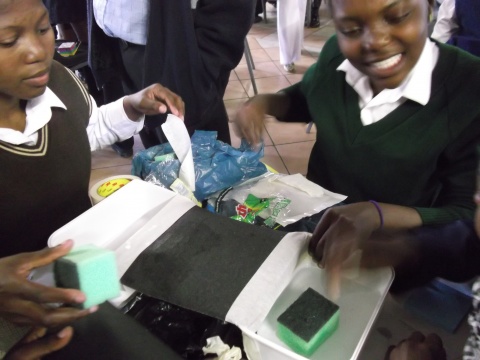
About 40 Grade 10 learners from both the Ebony Park and Ivory Park branches in Gauteng attended the Hip2b2 Innovation Challenge Introduction Event. The focus of the event was to spark the interest of learners in Maths and Science and they were told that their innovation could win them the ” SA Young Innovator of the year award.”

Maths, Science and Technology related topics where presented to the learners in a fun, interesting and relevant way. It was a fun-filled afternoon event with activites, team challenges and videos introducing learners to the world of innovation, science and engineering. Learners were given guidance on how maths and science lay foundations or building blocks for careers in the fields of innovation, technology, healthcare, safety and transport.
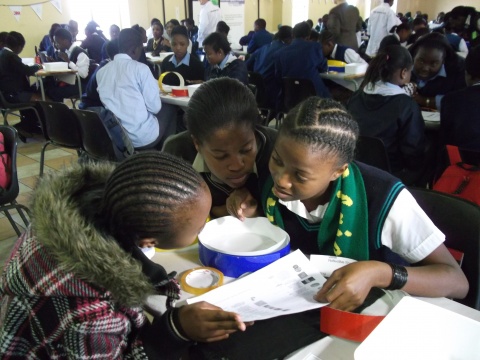
HIP2B² has partnered with 3M, a diversified technology company serving customers and communities with innovative products and services and industry leaders in innovative solutions for everyday life, and our learners got to see how exciting maths and science can be.
Our learners are geared up and ready to show the world how they can contribute to their communities positively.
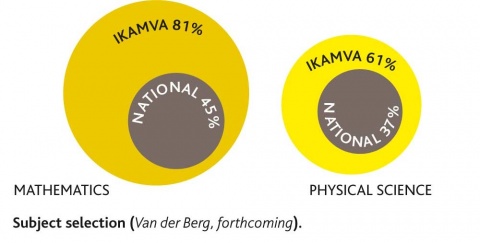
IkamvaYouth is pleased and proud to announce the publication of Against the odds: An evaluation of the IkamvaYouth programme, by a team of economists at the University of Stellenbosch. Servaas van der Berg and his team conducted an in-depth evaluation of IkamvaYouth, by administering questionnaires and interviewing 828 ikamvanites (past and present).
The full report is available here for download, and contains a wealth of information, results, analysis, quotes from ikamvanites and recommendations for improvements and scale.
Some of the findings have validated the results we’ve reported via our own tracking (see below). However, there were also some new and interesting findings, including:
- Insight into ikamvanites’ wealth and living standards
- Only 38% of ikamvanites live with their parents; 45% sometimes go to bed hungry; only 31% have their own desk or table at home and 65% have their own bed.
- 22% of mothers have matric and 11% have some post schooling
- 15% of fathers have matric and 9% have some post schooling; 32% of fathers’ education levels are unknown
- Matric results as compared with those of our feeder schools
- Detail regarding learners’ choosing Maths and Science and their performance in these most-challenging subjects
- “An overwhelming majority (81%) of Ikamva students in 2011 elected to do Mathematics, versus less than half of all candidates nationally. For Physical Science too, far more Ikamvanites chose this difficult option. Reponses to the survey indicate that similarly high proportion of former Ikamva students had elected these two subjects: 78% wrote Mathematics and 54% Physical Science.”
- “The difficulty of these subjects can be gauged from the fact that nationally, the pass rate (at 30%) is 46% and 53% for these two subjects respectively, much lower than for other electives such as Geography (70%) or History (76%), despite the fact that the candidates in these first two subjects are a far more select group in terms of academic ability. This ambitious subject choice is even more exceptional when compared to learners from similar (mainly township) schools. Ikamva’s encouragement of learners to take these more difficult subjects necessarily affects the relative pass rates and the subject performance of Ikamva learners negatively, thus the need to carefully consider this when evaluating Ikamva learners’ results.”
- “61% of all Ikamva matric candidates wrote and passed Mathematics, as against only 21% for all South African matric candidates.3 The proportion of all Ikamva matric candidates who achieved 40% or more was 28% versus 14% for all South African candidates. Compared to similar communities the Ikamva performance in this regard would even be more impressive than this.”
- ” What Ikamva thus successfully manages to do is to encourage learners from across the ability spectrum to raise the bar, by entering for subjects which the typical student from weak schools would usually avoid, and then to achieve success which is at least comparable to that achieved by candidates that often are more selected in terms of ability and from higher socio-economic groups. This is a truly impressive achievement.”
- The good results are consistent: “average results differ little between branches”
- The programme is very highly regarded by our learners and ex-learners (they do tell us these things, but it means a great deal more when told to independent evaluators)
- “The evaluation team is confident that Ikamva’s short term impact is considerable. This lies not only in the improved matric performance, but even before that in helping to create an environment where children from often very disadvantaged circumstances feel a sense of belonging and that someone cares about their needs and ambitions. That alone is a very valuable contribution. The extent of this contribution cannot be measured, but is visible in the fact that Ikamva was so highly praised by all who participates in it, or have done so in the past. As an evaluation team we have not seen such universally high praise of an organisation before.”
- Insight into the “success factors” behind the IY model
- “The remarkably successful personal relationships that Ikamva has developed with participants, based on extremely sensitive interaction with learners, yet without undermining basic discipline: “Kickouts” still occur and learners know that they can only remain part of the “family” if they play their part.”
- The tutors: “They are largely volunteers and mostly young. The fact that many of them are former Ikamvanites say something about the glue that holds Ikamva together: A positive social context in an environment where many face harsh circumstances at home, in the labour market, schools, universities, and wider society. The link with Ikamva means much to them, and also provides some continuity in their lives. Also, they act as role models to learners, thus further strengthening the desire of learners to undertake tertiary studies. Their relative youth also means that communication with learners is easier, in contrast to what learners experience at school. The team found no evidence that the tutors were particularly well trained or that they were always much better teachers than those in schools; the commitment, positive interaction and additional time were apparently most important in the success of students, not the better teaching.”
- “The fact that Ikamva operates in metropolitan environments where there are universities close by is an important factor in its success. Without a strong volunteer base, the tutors would not have been available, and it would have been more difficult to build the passion for tertiary studies that drives many Ikamvanites.”
- “The most important factors in Ikamva’s success, however, appear to be its commendable organisation, good planning and the enthusiasm of those at the head of the organisation. This enthusiasm is contagious.”
- Matric results
- “85% of Ikamva candidates passed, against the 70% nationally, or put differently, that Ikamva’s failure rate of 15% was half of the national average. But the full extent of Ikamva’s performance success is not yet captured in simple pass or fail rates: What is quite impressive is Ikamva’s performance in terms of getting learners access to universities: 36% of Ikamva candidates, versus 24% nationally, obtained a so-called “Bachelor’s degree endorsement”, i.e. a pass that is considered by the Department of Basic Education as good enough for degree studies. This is what used to be referred to in the past as “university exemption”. Data on a race basis is not yet available for 2011, but to put the Ikamva performance in terms of potential university entry in perspective, it is worth considering that the proportion of black students who obtained such exemptions in 2007, the last year for which race data could be obtained, was only around 11%. Altogether 72% of Ikamva candidates passed with either Bachelor’s or a Diploma endorsement, i.e. could potentially attend a university for degree or diploma studies (some universities have stricter entry criteria, though), whilst this proportion is only 53% amongst matric candidates nationally.”
- Placement into post-school opportunities
- More than half of respondents who had matriculated whilst participating in Ikamva after matriculating (58% of the 119 such respondents in the survey) indicated that they had gone onto university studies, and another 14% that they had continued onto “college” (here interpreted fairly broadly as other post-school studies). This thus left only 28% who had not gone on to further studies.
Key recommendations which we’re currently considering carefully include:
- Find ways to support learners as they adjust to life at tertiary
- “Ikamva could, and should, find ways of assisting students to make the transition to university, both by assistance with the initial exposure to academic English that many respondents to the qualitative interviews found daunting, and by helping them to find support structures to reduce the anomy that they experience when starting at university. Ikamva would have to decide how much of this it wants to engage in itself (which is not its core activity), and how much can be done by assisting Ikamvanites to link to other institutions (e.g. NGOs and university structures) that could assist.”
- Provide more support to build proficiency in Academic English
- Scale cautiously:
-
“Given how important Ikamva’s leadership is in its success, one may well argue that it would be extremely difficult to scale up the activities, particularly across many more centres. The evaluation team has indeed expressed its reservations about that in previous interaction with Ikamva: It is easy for leadership to under-estimate the importance of its own role. A dilution of this leadership across a much bigger organisation may lead to the programme losing some its attractiveness to students. On the other hand, analysis shows little difference in performance between branches. This could be interpreted as that the success lies in the model, and not in the particular leadership at branch level. This would be consistent with a view that expansion could be attempted as long as good branch leadership can be found. A cautious approach may be to consider expansion only when there are good support structures and where good branch managers are available, but not to be over-ambitious. The strong central leadership capacity that Ikamva possesses for planning and organisation is an asset that could be built on and that may offer a solid foundation for expansion, but it should not be endangered by too rapid expansion. Also, expansion should retain the essentials of the existing model, which importantly includes proximity to a university environment, preferably in a metropolitan area. This limits scalability, but such a conservative stance may be appropriate.”
IkamvaYouth is greatly appreciative to the Evaluation team (Nic Spaull, Ronelle Burger, Cobus Burger, Chris van Wyk, Servaas van der Berg, Robert Dzivakwi and the fieldworkers), ikamvanite Phillip Mcelu for tracking down 95% of all ikamvanites (!), DGMT for making this possible, and to all the ikamvanites who participated in the survey and interviews.

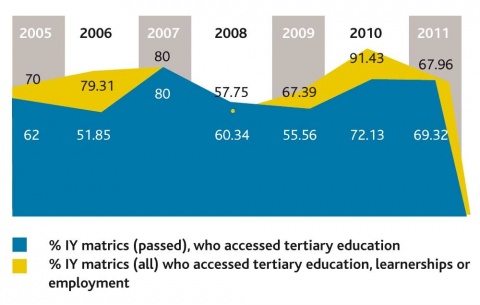
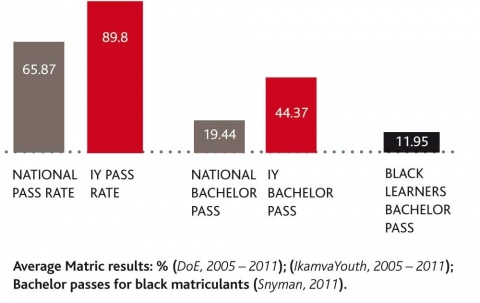
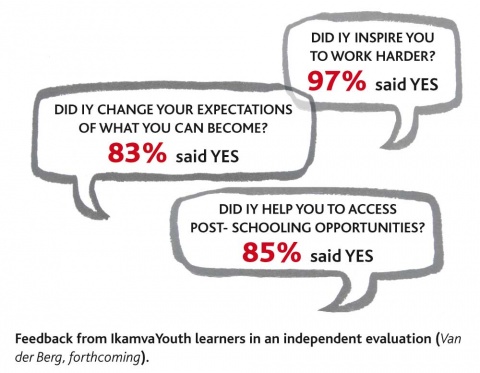
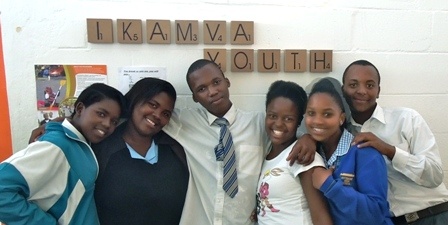
Makhaza students were abuzz last week with excitment and creativity when they got the chance to create a music video for the Adobe Youth Voices Aspire Awards. (VOTE TODAY!) This program is designed to provide youth in underserved communities with the critical skills they need to become active and engaged members of their communities and the world at large. By engaging these young people in exciting and meaningful new ways it provides a platform for them to communicate their concerns, aspirations, and vision using modern communications skills in telling stories that make a real impact.

Shelley Smith, a UCT masters student who facilitated the project for us and has this to say:
“It has truly been such a joy and inspiration to work with the group of IkamvaYouth participants involved in the Adobe Youth Aspire Awards project. I feel honoured to have had the opportunity to get to know such intelligent, creative, innovative, and passionate people; From them I have learned so much and am inspired to do so much more. The participants were given the task of creating a multimedia project which addressed critical issues and provided solutions for positive change. They chose to produce a music video combining mixed beats, acting, rap, poetry and song all student-created, filmed, and edited. The participants were given a very short amount of time to develop and execute the project and they did so with positively soaring colours.
What was beautiful to witness was the profound importance of the project to the participants and the pride they took in their work, not just because it was a fun music video, but because of the message they were communicating to their peers and to the world through a medium that showcased their individual talents and gifts. Their video addressed the crucial importance of education and how, no matter what obstacles one faces or peer pressure one encounters, he or she must keep working hard, believe in himself, never give up on his dreams; As the video states, this is the way to ‘drive poverty away.’ The video highlight Ikamva Youth as a vessel that strengthens them both academically and emotionally and is a necessity for them if they are to succeed in achieving their goals.

My role in the project was to guide the participants in the whole process and keep a structure in place; structure for the actual music video as well as timing structure of the steps needed to create, shoot, and edit the project to meet Adobe’s deadline. Given my background in broadcast journalism, I also ran a videography and editing workshop with the three IkamvaYouth members who served as the ‘camera crew’ and the main editor. I was blown away at how quickly the ‘media team’ picked up on the tips and skills I had to share with them and how eager they were to learn and get into the meat of the work – Made my job as teacher very easy! 🙂
Aside from the brilliant talent the members brought to the table, their teamwork, respect for one another, and communal effort to make the video the best it could be was truly amazing. I’ve so loved the time spent with each of them; many laughs, many jokes, many memories to be treasured. I cannot wait to see where these all-stars go and hope to continue working with Ikamva in the months to come. Great job everyone! 🙂 “
Check out the video here!
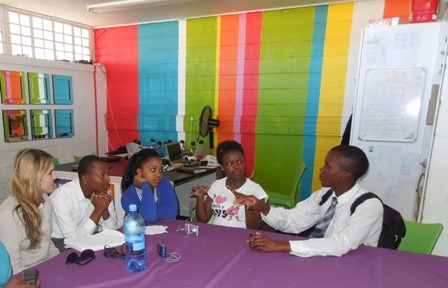
Big up Shelley, We love you!

Since the earliest days of IY’s existence, ikamvanites have dreamed of extending our reach to the province from where many of us originate and – given the abysmal academic performance and other challenges – we’re clearly needed. We’re now thrilled to announce that, thanks to key IY supporters including Capitec and the Learning Trust, IkamvaYouth is looking to establish the first of hopefully many branches in the province.
Co-founder of IkamvaYouth, Makhosi Gogwana, is based in the province and is the backbone of the Chief Directorate for Local Economic Development support to municipalities. He’s very keen to support the organisation’s expansion to many areas, and says “I am always thinking about the work of IkamvaYouth with huge satisfaction… I salute all of you.”
I was fortunate to meet with many other individuals and organisations doing very interesting and inspirational work in Grahamstown in February, and due to the enthusiastic and supportive response from each of them, we have decided to establish the first EC branch in Grahamstown 🙂
Rhodes University’s Centre for Community Engagement is a central collaborative hub for community-based organisations, integrating student volunteerism and service learning opportunities. Di Hornby and Margie Keeton expressed their support for the IY model, and affirmed the need for our programme (and, we’re all hoping, replicated results!) in Grahamstown. The Centre’s report on Community Engagement provides a useful and inspiring overview of the centre and its partners’ work.
I also met with Shireen Badat from Upstart, and was very excited to learn about her talented and hardworking grade 10s who need ongoing academic support in order to improve their academic results and especially their performance in matric. Have a look at the learners’ latest edition of the awesome Upstart paper: Youth Speaking to Power.
Jan Blom came all the way from Nemato (The Nelson Mandela Township, between East London and PE) to meet with me, and his incredible story affirmed the commitment and passion that exists in the area. His organisation, Nemato Change a Life, is doing incredible work in providing ongoing and long-term support to the youth of the area, enabling them to access opportunities and improve their lives. They also place great emphasis on commitment, and we spoke about ways to integrate Nemato Change a Life’s sports programmes, and integrating IY’s academic and career guidance programmes for the Nemato youth.
Finally, I met with Anna and Rob from the Village Scribe Association, where they introduced me to Awarenet. Most fortuitous, as we’ve been trying to figure out a way for ikamvanites to leverage social networking on the ikamvanitezone in a way that’s distinct and separated from the general noise on Facebook. Our developers have since been working away to connect Awarenet with the Zone, and it’ll very soon be available to every ikamvanite to connect, share and learn with each other between branches and indeed with other learners across the country.
It is clear that each of the organisations I met share our values and we are very much looking forward to linking and collaborating with them. Next steps for us are hiring a regional coordinator, finding a venue and securing additional funding.
With Rhodes as a welcoming partner and the many organisations keen to collaborate, we’re feeling very positive about taking the first steps in establishing our first IYEC branch. Clearly, the real challenge that we will address in the coming years is extending the IY model into rural areas, and our plan is for the Grahamstown branch to become a central hub from which far further-reaching activities will emanate.
Nemato, Axium and the Village Scribe Association are all doing really interesting work in challenging rural environments, and IY is looking forward to learning from, partnering with and eventually extending the model so that it’s no longer limited by the need for proximity to university campuses for volunteers. We’re looking forward to leveraging technology and the experiences of those who’re currently engaged in improving education in rural areas, so watch this space!


Ikamvanites had an amazing opportunity to be part of a Write4Life workshop at the end of March organised by FunDza Literacy Trust. The aim of the workshop is to support aspiring writers on their literary journey and provide them with useful skills to practice their craft. All the learners who participated acquired skills to translate their creative ideas into accessible and engaging pieces of work. They also had a chance to network with other keen writers and learn from the group experience. They got the opportunity to practice techniques to communicate effectively in the written form and receive good tips for writing for a critical audience.
By the end of the two day course , learners got the opportunity to produce a short story that was published on theFunDza network. Check them out here or on Mxit at (Tradepost > Mxit Reach > Mobi-Books > FunDza). The learners also received a certificate of participation.
Nomie one of the participant said “Never thought that writing would be so interesting. In Makhaza branch we were asked as learners to write a short paragraph if we are interested in writing workshop. I wrote the paragraph then I was amongst of the learners who were chosen to take part in Fundaza writing workshop. In the workshop I learned how to write poems, autobiography, short stories. In my life I never wrote anything before but now I can write lots of things. The facilitators were very helpful. Now I can’t wait to share the information with Ikamvanites and help them to be great writers like me”

An example of some of the things written is:
Can I, and other poems
Poet: Zintle Nyathi
School: Harry Gwala High School, Grade 11
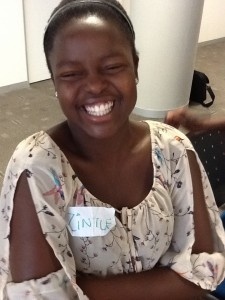
Can I?
Can I be who I am ?
Can I no longer follow instructions?
I want to be myself again.
Can I be intelligent, as I was?
I want to be who I was back then.
I’m tired of satisfying you.
Can I be myself again?
Can I ask you one question?
What does this mean to you?
I’m falling: you’re not helping.
I was walking, but now I’m crawling.
I’m inspiring, but you are not appreciating…
Why?
Where does this lead in future?
I’m tired of you.
Can I be who I was?
No satisfaction, but appreciation.
I’m tired of your games.
I want to be myself again.
My heart has been like a mirror
that has broken
When I pick up my pieces
I still see the cracks.
Can I be myself again?
***
If I never…
If I never grew
If I never knew
If I never do
If I never grew to see all the new experiences
If I never knew to listen to all the news
If I never did tell you that I do
If I never knew that living needs all respect due.
If I never grew to see these untold new stories
If I never did tell you that I do – where it was just doomed feeling.
If I never knew that life has all these new things.
I would never grow because I won’t do.
If I never grew I wouldn’t do because I never knew.
***
Impossible Mission
Why does it seem to be so cruel?
Why does it take time to reach the destination?
If we always say it’s impossible to achieve,
Day by day let them go by
Night by night watch the beauty of the stars
without observing the destination.
We let fear to our system of body
and let it bring fear to our imagination.
The most impossible mission – we all people surrender
Where this road is not taken
But you never gave it even a single try.
Why? Why?
Impossible mission. Impossible mission.
Let days pass by. Nights sleep not having a dream to take even one step.
Why impossible mission?
Mission is a destination to reach
But ups and downs are considered in this cruel world
you life or die but family is important.
For every story there’s success.
Behind success there’s a story.
Let impossible to possible be – strive for victory!
Big thank you to FunDza for this wonderful event, read some of the other works created here
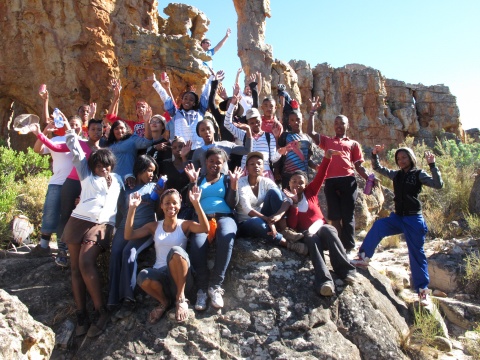
Masiphumelele March Newsletter highlights…
Leopard Trust Camp
The Easter Holidays begun and to celebrate we loaded a bus full of the most committed Ikamvanites (most were platinum learners with 100% attendance) and drove to the Cedarberg wilderness picking up some young people from Mitchells Plein along the way.
Ikamvanites had expressed an interest in being exposed to more diversity, which spoke to Nico and my heart. We therefore jumped at the invitation from the The Leopard Trust and roped in a church group and Mondale High School in Mitchells Plein and headed off for a week of sleeping in tents, eating off laps, and having cold showers!
The programme was a perfect mix of social and personal development alongside conservation, environmental awareness, cultural history and leisure. As you can imagine it was a rather special week. Students were challenged with a 4 hour hike up to the Wolfberg Cracks, a solo hike, cooking for 30 people, and washing up for 30 people. Games were played around the campfire in English, Xhosa, Afrikaans and even French (so Nico didn’t feel excluded). Moreover it gave a chance for youth from different backgrounds and cultures to unite and find common ground and develop beautiful friendships.
With words like ‘Phenomenal’ and ‘Mind-blowing’ being used to describe the week it clearly had an impact on the learners. Various lessons were learnt over the week. Phumza Kibi realised ‘that as people we must look after each other and help someone if she/he needs help. There is no room for selfishness”. Many opened their eyes to the need for environmental conservation and committed themselves to recycling and saving water in their communities. The camp gave learners confidence, both socially and personally; “I will now never give up, I will always strive to reach the top!!” Okuhle Beyaphi.

Ladies Club Sleepover and Beach Day
Isabel Malone has been holding Ladies Club once a week for the past few months and decided to organise a sleepover and beach day in her final month. 20 ladies, including GAP volunteers ascended on Isabel’s house on the 24th March and tucked into spaghetti, snacks, popcorn, and chocolate whilst they watched chick flicks, and discussed all manner of issues and topics.
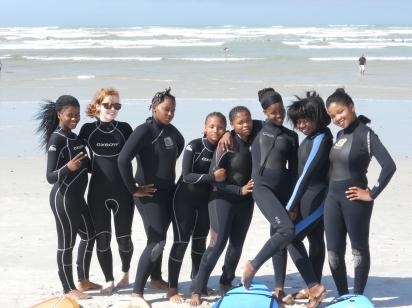
The Sunday was spent on Muizenberg beach getting rather windswept. Several were brave enough to tackle the ocean on a surf board. We now most certainly have some surfer girls on our hands!
Man Club hike and St James swimming lessons
Man Club is firmly up and running and March saw the men learning to swim, and hiking up local mountains. It is such an important project that emphasises what it is to be a man and the responsibilities and pressures that young men of South Africa have put upon them and how they can navigate these pressures and duties without jeopardizing their futures.
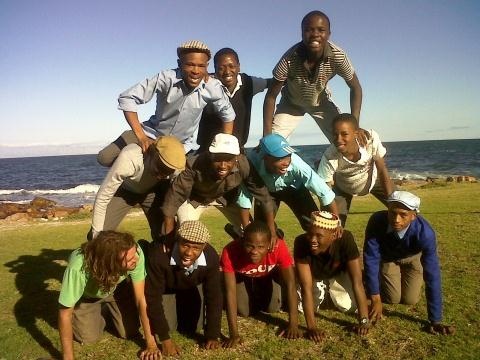



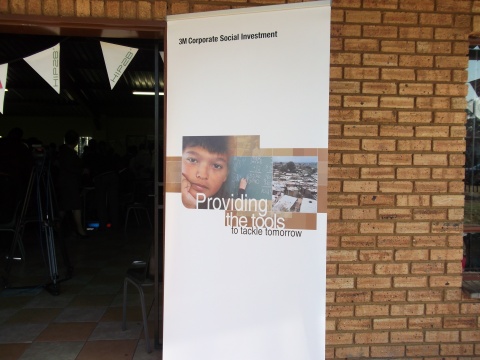
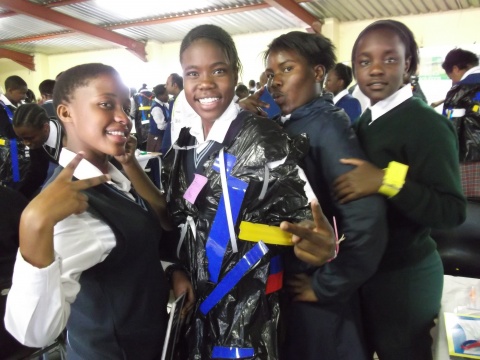














 Lloyd Lungu
Lloyd Lungu